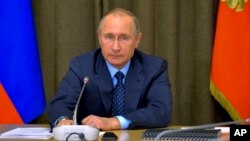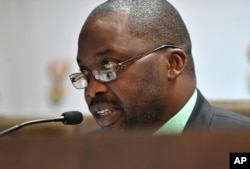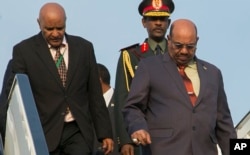Russia’s announcement Wednesday that it is withdrawing from the International Criminal Court is a symbolic blow to international justice, but it will have no practical effect on the court, experts said.
The Rome Statute created the court in 1998. Two years later, Moscow signed on to it, but never ratified the statute to become a full member.
“Membership of the Rome Statute, is a voluntary and sovereign decision, which is the prerogative of all states,” ICC spokesman Fadi El Abdallah told VOA in an email. “[The] ICC is respectful of each state’s sovereignty,” he added.
“As Russia had not ratified the Rome Statute little will change in practice; however, the decision is an alarming indication of Russia’s unwillingness to cooperate with international justice systems,” said Amnesty International’s Russia Director Sergei Nikitin.
Moscow’s foreign ministry said in a statement Wednesday that The Hague-based court is not a “truly independent and authoritative judicial body” and dismissed its work as “one-sided and inefficient.”
The move comes a day after the court’s chief prosecutor issued a report stating that the situation in Crimea and the city of Sevastopol “factually amounts to an on-going state of occupation” of Ukrainian territory by Russia.
Russia annexed the Ukrainian Black Sea Peninsula in March 2014 after a widely criticized referendum.
Court’s future
The move comes as the International Criminal Court faces defections from some African members. South Africa, Burundi and Gambia have all notified the United Nations that they are leaving the ICC.
African states have complained they feel the court’s work is overly focused on their nations. While the court is pursuing several cases related to African countries, it also is conducting investigations and cases into Afghanistan, Colombia, Cambodia and other states.
“If the state parties, who apparently have been masquerading in recent years as countries devoted to criminal accountability, want to leave, then they should leave,” U.N. High Commissioner for Human Rights Zeid Ra’ad Al Hussein told the court’s annual gathering Wednesday at The Hague.
He said he was not convinced their positions are based entirely on principle. “Quite the opposite; it appears to aim more at protecting their leaders from prosecution,” the high commissioner said.
'Key moment'
The court has an arrest warrant out for Sudan’s president, Omar al-Bashir, for crimes committed in Darfur. It also dropped a case against Kenya’s President Uhuru Kenyatta for post-election violence in 2007 and 2008.
“We are at a really key moment,” Human Rights Watch’s Associate Director of International Justice Elizabeth Evenson told VOA from The Hague, speaking about the court’s future.
“Because there is a risk that because we have seen a couple of countries leave the ICC, that could become some kind of a bargaining chip for concessions that would undermine the work of the ICC,” said Evenson.
She pointed to the push by some African countries to eliminate the court’s authority to prosecute sitting heads of state, worrying that some countries might be willing to bargain over that to keep others from leaving the court.
“But what is needed now is not concession,” Evenson said. “What is needed now is for all ICC member countries to stand firm, to stand behind the court, to stand on the side of victims.”






